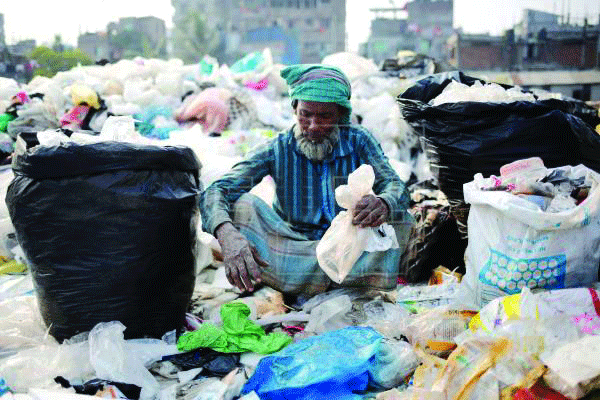Prohibited, but still present
Polythene shopping bags-3
Golam Mostafa Jibon: Despite the ban, Polythene shopping bags have returned to the market due to lax-vigilance by the authorities concerned that posing serious threat to the environment.
It is now being used openly in Dhaka and all over the country. Use of Polythene is not being stopped as there is a provision of minor punishment in the existing law. Although, the country has been declared free of Polythene bags, the use of Polythene bags has not decreased in the country anyway due to lack of application of law. Polythene was banned in Bangladesh from December 1 in 2002 and the country was declared Polythene bag free. Used as a shopping bag, this polythene bag became the biggest cause of environmental pollution in the country. But that polythene is being used again. Shopkeepers use polythene bags for various reasons.
However, they demanded that action be taken against those who produce polythene bags. The use of polythene cannot be stopped unless illegal production is stopped. Buyers, who carry products in polythene bags, said the same thing. They demanded that its production should be stopped. They want strict measures against polythene users and producers. They also know that polythene is harmful to the environment.
About 50,000 crore polythene bags are used every year, which turns into contaminated waste after use. In addition, chlorinated plastics emit toxic chemicals, which combine with groundwater and surface water to enter the food cycle and cause constant damage to the human body. When plastic waste is burned, invisible micro-particles cause terrible air pollution. Overall the environment emits black smoke, lead and various untreated waste products. The plastic in the soil interferes with the production of agricultural products and the growth of plants. Lack of oxygen hinders the production of various crops and the growth of plants as it prevents them from taking oxygen from the soil. Sometimes the tree dies prematurely. In addition, due to the plastic layer, rain water could not reach the soil, so the ground water level went down. In addition, plastics cause a greenhouse effect on air pollution.
Considering the harmful aspects, plastic products and plastic bottled water have been banned in various cities of the United States since 2016. Several other countries have also taken steps to control the use of harmful plastics.
Marketing of plastic bottled water was banned in 2009 in Bundanon, New South Wales and Australia. But in Bangladesh no activities are being observed to control the use of plastic products. Bangladesh is now in the tenth place on the list of top countries in plastic pollution. In this situation, environmentalists are advising everyone to be aware.
Alexander Parks first discovered plastics in 1855 by reacting plants with cellulose and nitric acid. He named it Parkinson. Then in 1869, John Wesley discovered synthetic polymers and celluloids. In 1907, Leo Beckland invented a completely synthetic plastic and named it Bakelite. He was the first to use the word plastic. Also two scientists, who have made unique contributions to the production of plastics, are Nobel Laureate Hermann Stodinger, the father of polymer chemistry, and Hermann Mark, the father of polymer physics.
At first, nylon was a commercially successful synthetic thermoplastic polymer. Later the discovery of plastics like acrylic, polystyrene, polyvinyl chloride, synthetic rubber and polyethylene (polythene) made most of the products and parts of it necessary for all levels of life made of plastic. Due to excessive use of plastic, everything in water, land and space is now a victim of plastic pollution.
There are also occasional raids against polythene bags. The maximum penalty for selling polythene bags is a fine of Tk 5,000 or six months imprisonment. Analysts said that is not enough to stop the use of polythene bags.
Rare Israeli airstrike in Beirut kills Hezbollah commander and more than a dozen others
International Desk: Israel launched a rare airstrike that killed a senior Hezbollah milita…








